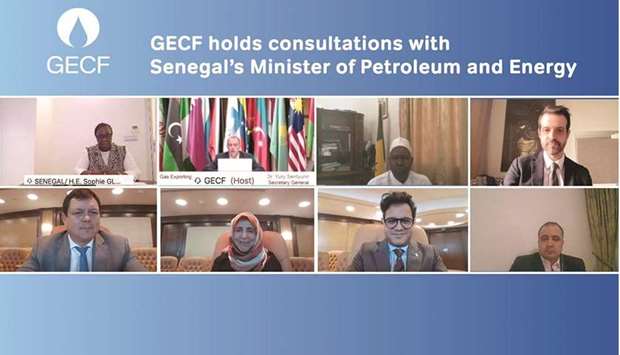The Gas Exporting Countries Forum (GECF) and a high-ranking delegation of the gas-rich Republic of Senegal held a virtual meeting to pave the ways for enhanced co-operation.
GECF secretary general Yury Sentyurin delivered his opening remarks before Senegal’s Minister of Petroleum and Energy Aissatou Sophie Gladima, who led the delegation, and Mamadou Mamoudou Sall, ambassador of Senegal to Qatar.
Although Senegal is not yet a producer of natural gas, it is expected to be a behemoth beginning in 2023 thanks to the development of the Great Tortue project in the north of the country, as well as two lesser known projects in the south. The gas projects currently running in Senegal amount to around 32bn cubic metres (bcm) of gas reserves.
“Your generous contribution motivated us to reiterate our full solidarity with your esteemed country and note that there are striking similarities and alignment in our values. Speaking about Senegal, your esteemed country has succeeded in fast-tracking its oil and gas developments, despite recent uncertainty caused by Covid-19, establishing itself as West Africa’s leader in the energy transition,” stated Sentyurin.
Despite recent uncertainty caused by Covid-19, the government is leading a gas revolution through the implementation of its gas-to-power masterplan, aimed at providing stable and cheap electricity for Senegalese citizens.
“Senegal’s energy agenda set by the honoured President of Senegal, Macky Sall, who has identified gas-to-power as an important industry driver to fuel the country’s economic growth, is highly commendable.
“The GECF completely shares the vision of natural gas as the fuel of choice, due to inherent environmentally friendly nature of the resource, its affordability, reliability and flexibility, which is essential in ensuring economic development and social progress,” Sentyurin stressed.
Recalling participation of Gladima in the 22nd GECF Ministerial Meeting, Sentyurin reiterated the forum’s commitment to strengthening consolidation, particularly at a time of economic downturn and energy market volatility.
Welcoming the opportunity for the dialogue, Gladima noted that it is her government’s policy to engage in win-win partnerships in line with the energy policies imposed by Sall as part of the Senegal energy plan that will run up to 2035.
“President Sall reminds all of us that natural resources of Senegal, according to the constitution, belong to all of the people. This is even enshrined in our local content policy: that the people should benefit maximum from Senegal’s natural resources,” she said.
This is perhaps why the ministry enjoys a mandate for reserving amount of upcoming gas production for gas-to-power projects, with the objectives of significantly reducing electricity tariffs. “Reducing electricity tariffs is not one of the only objectives of gas production. There’s also diversification of resources into pharmaceuticals, petrochemicals and other industrial applications to extend the supply chain,” Gladima said.
Gladima took particular note of the upcoming launch of the GECF Global Gas Outlook 2050 and expressed her keenness to send Senegalese representation.
Sentyurin assured his counterpart of full co-operation on a variety of practical steps: implementation of regular data and information exchange channels, regular consultations pertaining to issues on energy and natural gas markets, and mutual engagement in events.
Although Senegal is not yet a producer of natural gas, it is expected to be a behemoth beginning in 2023 thanks to the development of the Great Tortue project in the north of the country, as well as two lesser known projects in the south. The gas projects currently running in Senegal amount to around 32bn cubic metres (bcm) of gas reserves.
“Your generous contribution motivated us to reiterate our full solidarity with your esteemed country and note that there are striking similarities and alignment in our values. Speaking about Senegal, your esteemed country has succeeded in fast-tracking its oil and gas developments, despite recent uncertainty caused by Covid-19, establishing itself as West Africa’s leader in the energy transition,” stated Sentyurin.
Despite recent uncertainty caused by Covid-19, the government is leading a gas revolution through the implementation of its gas-to-power masterplan, aimed at providing stable and cheap electricity for Senegalese citizens.
“Senegal’s energy agenda set by the honoured President of Senegal, Macky Sall, who has identified gas-to-power as an important industry driver to fuel the country’s economic growth, is highly commendable.
“The GECF completely shares the vision of natural gas as the fuel of choice, due to inherent environmentally friendly nature of the resource, its affordability, reliability and flexibility, which is essential in ensuring economic development and social progress,” Sentyurin stressed.
Recalling participation of Gladima in the 22nd GECF Ministerial Meeting, Sentyurin reiterated the forum’s commitment to strengthening consolidation, particularly at a time of economic downturn and energy market volatility.
Welcoming the opportunity for the dialogue, Gladima noted that it is her government’s policy to engage in win-win partnerships in line with the energy policies imposed by Sall as part of the Senegal energy plan that will run up to 2035.
“President Sall reminds all of us that natural resources of Senegal, according to the constitution, belong to all of the people. This is even enshrined in our local content policy: that the people should benefit maximum from Senegal’s natural resources,” she said.
This is perhaps why the ministry enjoys a mandate for reserving amount of upcoming gas production for gas-to-power projects, with the objectives of significantly reducing electricity tariffs. “Reducing electricity tariffs is not one of the only objectives of gas production. There’s also diversification of resources into pharmaceuticals, petrochemicals and other industrial applications to extend the supply chain,” Gladima said.
Gladima took particular note of the upcoming launch of the GECF Global Gas Outlook 2050 and expressed her keenness to send Senegalese representation.
Sentyurin assured his counterpart of full co-operation on a variety of practical steps: implementation of regular data and information exchange channels, regular consultations pertaining to issues on energy and natural gas markets, and mutual engagement in events.

